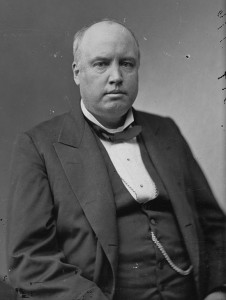Celebrating Robert G. Ingersoll, “The Great Agnostic”

Robert G. Ingersoll was born on this day, August 11, in 1833. Ingersoll was a Civil War veteran, a lawyer, an orator, and most importantly a humanist. While never describing himself with that exact label, it’s clear by the spectacular speeches and talks he gave throughout his life that Ingersoll was an early champion of humanist values. He advocated for the political rights of African Americans, women, and the poor. On August 11 we honor him and his dedication to reason, critical thought, and humanity.
Several American Humanist Association staff members celebrated this fascinating figure with a DC walking tour given by Steve Lowe, a board member of the Washington Area Secular Humanists. The tour took place in the heart of downtown DC, covering the office where Ingersoll worked as an attorney for the budding railroad industry, Ingersoll’s Lafayette square townhouse where he held lavish get-togethers and campaign meetings with congressmen and government officials, and a few of the venues where Ingersoll delivered his heralded speeches condemning religion, ignorance, and inequality.
At the National Theatre in 1884, Ingersoll delivered to a full house his “Orthodoxy” speech, a bold address filled with funny quips and progressive desires about the state of religion in the country. To the congressmen-filled audience he joked, “They often pray for the impossible. In the House of Representatives in Washington I once heard a chaplain pray for what he must have known was impossible: ‘I pray thee, O God, to give Congress wisdom.’”
Ingersoll further called upon an end to orthodox understanding of religion, maintaining that it held no place in the civilized world.
It is a religion that no longer satisfies the intelligence of this country; that no longer satisfies the brain…[it] wraps the coffin in darkness and fills the future of mankind with flame and fear….In its place I want humanity, I want good fellowship, I want intellectual liberty—free lips, the discoveries and inventions of genius, the demonstrations of science—the religion of art, music and poetry—of good houses, good clothes, good wages—that is to say, the religion of this world.
While Ingersoll may be seen as ahead of his time, the success and fame he received from his speeches is a testament to the fact that humanist values and progressive principles are foundational to our country. He spread the message of compassion, kindness, and reason to audiences that numbered in the thousands. The Washington Post called him the “Prince of Pagans” and the “plenipotentiary of his satanic majesty,” celebrating his dissent from the conventional wisdom. Despite his close ties and personal connections with representatives, having campaigned for almost every single Lincoln-Republican presidential candidate, Ingersoll himself never entered the public sphere. Although, he had many supporters and fans, it was believed that if a president had appointed him to the cabinet, he would never have survived a Senate hearing unless he agreed to give up his public speeches against Christianity.
Instead Ingersoll served his country, up until his death in 1899, through moving oration that sparked critical thought about the role of religion in our society and government. His 1873 speech, “Individuality,” put it best:
The truth is, our government is not founded upon the rights of gods, but upon the rights of men. Our constitution was framed, not to declare and uphold the deity of Christ, but the sacredness of humanity. Ours is the first government made by the people and for the people. It is the only nation with which the gods have had nothing to do. And yet there are some judges dishonest and cowardly enough to solemnly decide that this is a Christian county, and that our free institutions are based upon the infamous law of Jehovah….The Declaration of Independence announces the sublime truth, that all power come from the people.
